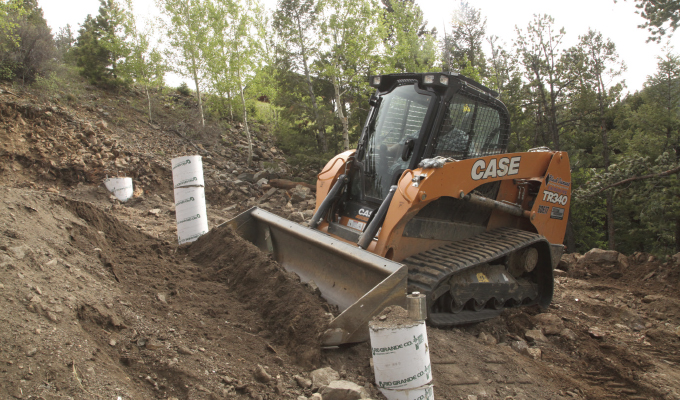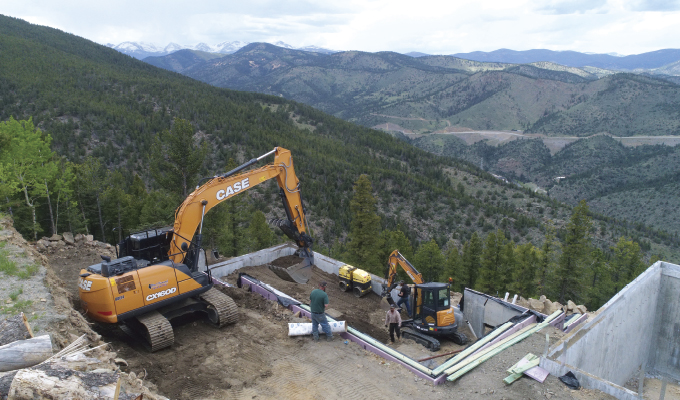By Andrew Dargatz
Take any drive through the foothills up into the Rocky Mountains, you’re bound to see a home or two, perched atop a mountain, that makes you think: “How did they possibly build that?”
That type of reaction fuels Steve Grapes, the owner of Black Diamond Excavating. He grew up in the Midwest, but now it’s hard to pry him from the mountains, where Black Diamond specializes in preparing sites on extreme mountainside pitches. In fact, his company is named after the steep slopes that make Colorado one of the country’s premier ski destinations.
“Me and my buddy were sitting down one night, and because we work on such extreme slopes … let’s call it Black Diamond,” says Grapes. “So, that’s what we did.”
THE PROJECT
CASE recently visited a new residential site where Grapes’ crew was running a CX160D excavator, CX37C mini excavator, and a TR340 compact track loader. Because of the nature of the site, perched on a 42 percent slope, Grapes stationed the CX160D outside of the foundation’s footprint on a flat landing, with the CX37C parked in the middle of the foundation, helping to move structural fill from one side to the other, assembly line-style. The TR340, meanwhile, serves a support role after initially being the workhorse that roughed-in the site by moving boulders and hauling 120 tons of sand down the slope.
The TR340, which Grapes dubs “an animal”, marries power, speed, and gradeability for working on steep slopes. The 90 hp Tier 4 Final machine delivers 3,400 pounds of rated operating capacity (ROC) and also boasts excellent fuel economy and zip with its 3.4L Turbo engine.
“We’ve tried other machines and I have not had one of them yet that can handle driving up a 42 percent slope with an empty bucket,” he says. “The biggest reason I run CASE equipment is the fuel economy. If I’m working it crazy, it’ll burn a little bit more fuel than normal, but for the most part, all my machines can run a long time on fuel. The speed of the TR340 is way faster than any other [comparable] machine out there, too.”

“We had to build the whole waste water system before we could do any excavation for a home site or garage. We were moving big rocks out of our way, getting everything out so that we could get that TR340 … it hauled over 120 tons of sand down this 42 percent slope” Grapes says. “We didn’t make switchbacks. We made it straight down because people need to save money wherever they can. We didn’t want to destroy the whole property. We’ll use the TR340, when it’s all said and done, to make all the final contours for drainage and for people to walk outside of the house from the upper level [down to the back side of the house].”
BUILT FOR SPEED, COMFORT
Grapes spends long days in his CX160, the primary material handler on site, handling any significant excavation and material handling. Much like the compact track loader, Grapes runs the excavator and mini excavator at one speed: fast. And at 38,400 pounds, it’s big enough to do the heavy lifting, but small enough to work on jobsites that are made smaller by the sheer grade of the slope.
“I’m always a power kind of guy. I think everything should have more, but you still have limitations on stuff. I think the CX160D just complements the type of work we do,” he says. “Like right now, on the back side of this house, I have just enough room for a 160 to be able to turn and not put too much load pressure on the concrete wall that’s below me. If I had a bigger machine, we could probably get it done, but the speed would not be there because we would have to be worrying about hitting the back of the machine, knocking the mountain down, or hitting the concrete wall.”
The speed and power of the CX160D is closely rivaled by its cab size and control customizability. The best-in-class cab space provides excellent visibility, and the pressurized and viscous-mounted cab reduces noise and vibration. Additionally, a standard Bluetooth radio and 7-inch widescreen monitor give operators streamlined communication and real-time access to key performance indicators.
“I’m a big man and I fit comfortable. I could sit in this cab 8, 10, 12 hours a day and not get tired of running the machine,” Grapes says.
For this all to work, they also need a more compact resource to handle the fine work inside the footprint of the foundation — that’s where the CX37C comes in.
“We do a lot of testing with these machines, where they go out and dig test holes for wastewater systems and foundations, to make sure that the ground is suitable to build on,” says Grapes. “There’s no sense in hauling around a big machine when you could bring something like this in and do the same quality of work. It’s a perfect machine because [operators] don’t have to worry about nothing hitting them in the backend. They can be in any tight area with the zero tail.”
LEAVING A LEGACY
A big part of that lasting success of Black Diamond is the support provided through its relationship with Titan Machinery, the company’s longtime equipment dealer. But Titan has been more than just a dealer to Grapes and his team, they’ve been a partner.
CLOSING THOUGHT
Grapes and Black Diamond are motivated to do premium work for their clients in part for their passion for the work, but also for the lasting impact it leaves on an already beautiful landscape. It’s a legacy that will live beyond the life of Grapes’ company or even the premium machines helping to craft the beginnings of his clients’ mountainside dreams.
About the author
Andrew Dargatz is a product marketing manager for CASE Construction Equipment. For more, visit www.casece.com.
Modern Contractor Solutions, December 2019
Did you enjoy this article?
Subscribe to the FREE Digital Edition of Modern Contractor Solutions magazine.



